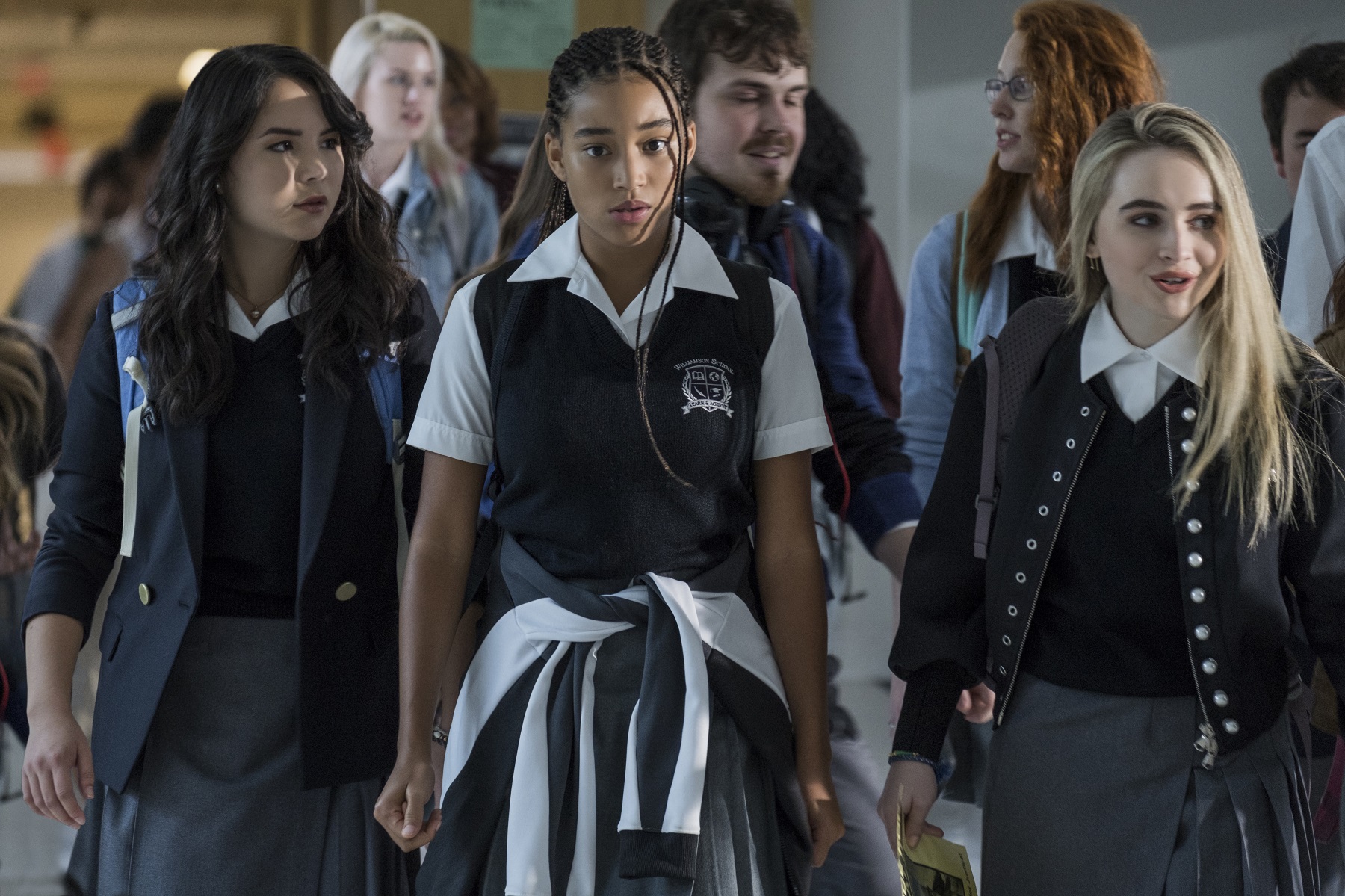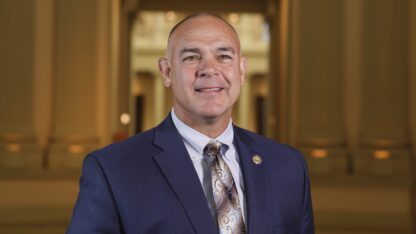Throughout elementary school and middle school, I often found myself switching in and out of my school facade. I changed the way I spoke and how I carried myself. As I got older, it got harder and harder to separate the two different Lexies.
After watching the movie, I’ve realized my power as well.
Lexi Rogers, 15
I was terrified to be called ghetto at school and was absolutely crushed when I got called “the Oreo” at church.
I began to question who I really was. I never wanted to turn away from my race. I’m proud to be a black girl.
However, I didn’t want to feel forced to change my behavior while with my friends from outside of school. Starr feels the same way I did. One day, I came to the realization that I didn’t have to be a chameleon that changes, based on my surroundings.
I can just be Lexi.
I’m comfortable in my own skin no matter where I go. Now, I speak clearly not because I’m trying to fit in. That’s just how I talk. I don’t feel forced to speak in ebonics. If I want to, I will, and I don’t care how anyone feels about it.
Because of a different and more tragic series of events, Starr comes to the same realization as I once did. She becomes only one version of herself which is composed of her school personality and her Garden Heights personality.
Her character truly inspires me to be even more unapologetic than I was before.
Not only does Starr become a black girl who changes for no one, but she also contains an immense amount of power. She finally recognizes her worth.
After watching the movie, I’ve realized my power as well.
I’m not only further inspired to be myself, but I also want to use my identity to make an impact. I will speak my mind and use my voice to change the world just like Starr did.
People of all different races, ages and genders should take the time to see “The Hate U Give.” No matter which of the many messages you receive by watching it, you will be changed by the experience.
— Lexi Rogers, 15, attends Woodward Academy and is a roller coaster enthusiast!
“The Hate U Give” is the most funny, painful, exciting and emotional movie you will watch in 2018, from Amandla Stenberg’s powerful performance to the amazing message behind it all.
The story follows the life of young 16-year-old Starr Carter (played by Stenberg) who leads a double life.
Starr lives in a poor, blighted, black neighborhood. In contrast, she goes to a predominantly white private school. She lives a pretty normal life, with her mom, dad, younger brother and half-brother (played by Regina Hall, Russell Hornsby, TJ Wright, and Lamar Johnson respectively).
But her whole life flips topsy-turvy when she bears witness to her childhood friend Khalil (Algee Smith) getting shot and killed by a cop who has pulled them over.
Angie Thomas, the novelist behind this incredible story wrote ‘The Hate U Give’ for young black girls to know that their voices matter and that their lives matter.
Rachel Springer, 14
Starr and Khalil are at a party when shots are popped off after a fight and Khalil and Starr go off in his car and drive away, not knowing what lies ahead for both of them. Khalil is killed because the officer thinks he has a gun when it’s really a hairbrush.
During and after this scene, I could feel my eyes start to water and tears fall down my face. Angie Thomas, the novelist behind this incredible story wrote “The Hate U Give” for young black girls to know that their voices matter and that their lives matter.
With racially motivated crimes on the rise since 2016, we as people casually turn a blind eye to this and act as if the world is all sunshine and rainbows. Yes, we protest in the streets for justice and post on social media to get some type of word out. But are we really changing anything? If we see a crime committed, do we step up and give the police a statement? No, not all of us. Some of us back down out of fear or cower because we don’t want to “get involved.”
But Starr finds the strength to stand up and fight for what she knows is right.
Being caught between two very different communities can be very stressful, particularly for teenagers. Having to be one person in the day and a completely different one at night.
By the end of the movie, Starr begins to learn it’s OK to be the same person you are in the dark and the light.
— Rachel Springer, 14, attends The Sedulity School and is an aspiring traveler.
Before “The Hate U Give” press screening, VOX ATL got a chance to interview Angie Thomas, the author of the book the movie is based on and asked her what inspired her to write the best-seller.
She responded that it was for the young black boys in her neighborhood who felt that Trayvon Martin could’ve been them. It was also for the young black girls who felt torn between two worlds who had never felt represented in the media.
The passion in her voice as she talked about it told me she genuinely meant every single word of it.
After seeing the film, I can confirm that not only Thomas but the entire cast put their entire heart and soul into every single part of this film.
I’m racking my brain of a way to describe the experience because this movie isn’t just a film, it’s an experience. One that I could only compare to that of seeing “Black Panther” for the first time. Of course, this time I traded out my finest of Wakandan threads for a dress adorned with social justice pins. The moods of the two films might be different, but I’ll argue that “The Hate U Give” is just as much of a superhero movie as “Black Panther.” If the former was the Blackest Celebration of the year then the latter is a collective therapy session for our culture.
The moods of the two films might be different, but I’ll argue that ‘The Hate U Give’ is just as much of a superhero movie as ‘Black Panther.’
Lyric Eschoe, 17
“The Hate U Give” does an amazing job humanizing the struggle to be young and black in America right now. We see that even before Khalil is killed, how Starr is already dealing with trauma.
She’s 16 with the weight of the world on her shoulders. She doesn’t fit in anywhere — she’s too black for the white kids but too white for the black kids. There’s an internal struggle that she doesn’t let anyone see that’s hurting her.
After the death of Khalil, we see how she’s forced to grow up and make adult decisions. The way the media blames her for being black as the reasons that her friend got shot. The way she can’t even enjoy being around her boyfriend at prom because of all the stress going on in her mind.
There’s an extra layer of realness to the story for Atlanta teens who watch this movie. While the book is set in the fictitious neighborhood of Garden Heights, the movie was filmed in Atlanta.
For any seasoned ATLien, especially those who live in Zone 4 or have a 30310 zip code, the street names and buildings are going to be super familiar to you. That familiarity makes everything feel even more real because I know that Garden Heights is almost identical to the neighborhood I reside in.
Every scene hurt because I saw myself on the same streets, and that very emotional fear added a whole other meaning to thinking “It could’ve been me who was shot on the streets.”
I want “The Hate U Give” to have the impact of “Black Panther.” It’s a not a celebration of blackness like “Black Panther” was, but in a way it is.
For some, it’s going to be eye-opening and raw. For others, it’s going to be a healing session. But there is something in it for everyone, and it’s something that everyone in America needs to experience.
— Lyric Eschoe, 17, is home-schooled and wrote this reflection while listening to Janelle Monae’s “Dirty Computer” album.
T.H.U.G L.I.F.E, an acronym that stands for “The Hate U Give Little Infants F–ks Everybody,” a quote attributed to Tupac Shakur.
The character Khalil Harris (Algee Smith) says this before he gets shot in the back twice by a white police officer. Even though the movie is fictional, it’s raw, teeth-clenching, and it has become one of my favorite films by far.
I was very surprised that I didn’t shed one tear, because the film is a tear-jerker. One of my favorite scenes is when Starr Carter (Amandla Stenberg) stands up to her twisted friend Maya (Sabrina Carpenter) when she says Khalil deserved to be killed. I feel like young teens live in a bubble that is either home or school.
This movie makes me realize standing up for yourself is extremely important, no matter what the issue, the reaction or outcome is.
Brooklyn Williams, 13
Starr has to “code switch” or live in a bubble that is either her Garden Heights neighborhood or Williamson, where she goes to school. Seeing the movie has changed the way I look through my so-called “bubble” that is eighth grade.
The crazy part is when you think about it, we as a community need this movie. It is crazy that we need a movie that depicts what happens out here in the real world for it to get people’s attention.
Police brutality is very much a real thing, so why do we need a fictional representation of it for people to sit up and realize? Many will brush it under the rug, others will protest, but nothing has been done to solve this recurring issue.
This movie makes me realize standing up for yourself is extremely important, no matter what the issue, the reaction or outcome is. It shows me not everyone is going to accept you for who you are and that is totally OK.
The last thing I got from this amazing film is that you do not need to change yourself or your personality to gain people’s approval and sticking together with the people who support you and understand you is important.
— Brooklyn Williams, 13, a student at KIPP Strive Academy and thinks Spotify music is the best type of music.
This story was published at VOXAtl.com, Atlanta’s home for uncensored teen publishing and self-expression. For more about the nonprofit VOX, visit www.voxatl.org.







